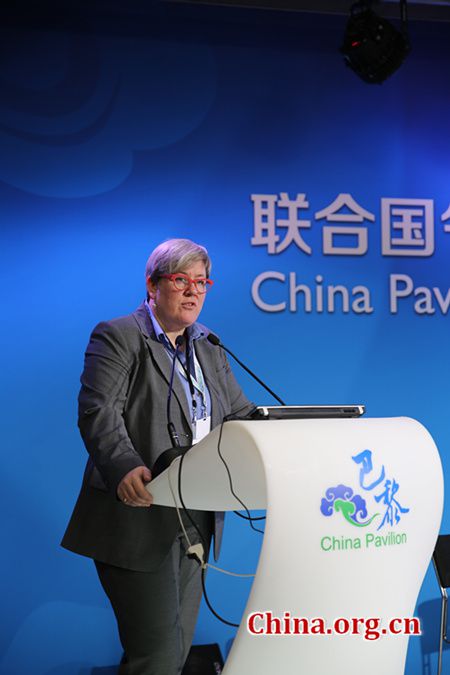WB hails China's efforts to fit low carbon development
 0 Comment(s)
0 Comment(s) Print
Print E-mail Xinhua, December 10, 2015
E-mail Xinhua, December 10, 2015
 |
|
World Bank's vice president and special envoy for climate change Rachel Kyte said Wednesday that China has set a "good example" in the integration of climate change control and national economic and social development. [Photo by Wang Fang/China.org.cn] |
World Bank's vice president and special envoy for climate change Rachel Kyte said Wednesday that China has set a "good example" in the integration of climate change control and national economic and social development.
Kyte said at the ongoing Paris Climate Conference that China's Intended Nationally Determined Contributions (INDC) includes a package of "hard" targets, such as emission peaking around 2030 and achieving non-fossil fuel share of 20 percent in the primary energy mix of by the same year.
"But more importantly, China's INDC covers in detail national and sectoral polices and outlines ways in which climate-change-related objectives can be integrated into the national economic and social development plans," Kyte noted in a side event organized in China Pavilion during the Paris climate change talks.
"We commend China's efforts to fit low carbon development plans into the overall strategy of restructuring and rebalancing its economy and to find a new development model," she said.
According to Kyte, tackling climate change is about effectively managing a country's economy and INDCs should be seen as the important drivers for innovation and low-carbon development, though the integration in particular and a transition toward low-carbon economy in general are very challenging for many developing countries.
She pointed out that in practice, an effective management of the economy with respect to climate change implies, among others, sending strong policy signals, clarifying the long term goals and putting a price on carbon.
Kyte noted that despite all these challenges and uncertainties, the implementation of China's INDC offers tremendous economic opportunities and environmental benefits such as numerous health benefits, as well as likely positive impacts on employment and technology improvements in many sectors of the economy.
Around 180 countries have made their submissions and outlined their mitigation targets for the post-2020 world.






Go to Forum >>0 Comment(s)